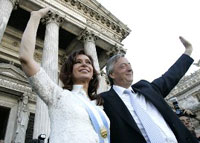Argentina first lady takes office
In a rare husband-to-wife handover, Argentina’s first lady, Cristina Fernandez de Kirchner took office as the first elected female president of this South American country on Monday. In her inaugural speech, Mrs. Kirchner has promised to continue with the policies promoted by her husband, which have led to four years of economic boom but failed to reduce poverty and inequality.

"We want Argentines to have hope again," she said. "While there is one poor person in the country, we will always be one step away from a definitive victory," she said as spoke at the National Congress after swearing in.
The Kirchners became the most powerful couple since Juan Domingo Peron and Evita Peron ruled the country between 1946 and 1955. Mrs. Kirchner does not like to be compared with Evita but had a few words for her: “Perhaps, I do not deserve this as she does. But she couldn’t”.
A 54-year-old mother of two, Fernandez is keeping many of her husband's top aides and has vowed to deepen his economic model emphasizing budget and trade surpluses and a weak currency to stimulate exports. Kirchner leaves office with high popularity ratings after taking power in 2003 with 22 percent of the vote, the weakest mandate in Argentine history.
Leaders from across Latin America, several European countries and the International Monetary Fund attended her inauguration, which has been marked by a flurry of diplomatic efforts to win the release of hostages held by leftist rebels in Colombia.
On Sunday, Seven South American leaders found time to announce the creation of a common bank called Bank of the South, which is aimed at become a development bank as an alternative source of funds to the World Bank and International Monetary Fund.
The Banco del Sur, or Bank of the South, is to be funded with $7 billion, the bulk of which will come from Brazil and Venezuela with Argentina contributing $800 million, according to press reports. Curiously, these countries will borrow money in the international market to fund the new bank, which will mean that they will lend at a higher cost than international lenders may offer.
The Bank was announced at the Argentine palace of Government by the presidents of Brazil, Argentina, Paraguay, Venezuela, Bolivia and Ecuador. Despite funds will come from international lenders, the Banco del Sur was announced as a new sign of “liberation and independence” of Latin America from central powers.
"We're making a decisive step in building the integration dream of the peoples of South America," Luiz Inacio Lula da Silva, the Brazilian president said, at the signing ceremony in Argentina's national palace, known as the Pink House. Hugo Chavez and Nestor Kirchner, the president of Argentina, pushed the initiative to create the regional bank in 2006, hoping it will help wean the region off what are widely seen as the negative influences of the IMF and World Bank.
Chavez said the bank was part of a broader "war" with the more advanced nations of the north. "The bank is a political fact and is part of an economic war that is also social and ideological," Chavez said. "We don't have money? We do, but it's deposited in banks of the north, in US treasury bonds ... in euros, in yens. The time has arrived to begin to bring these resources to the region," he said.
Hernan Etchaleco
Argentina
Subscribe to Pravda.Ru Telegram channel, Facebook, RSS!


